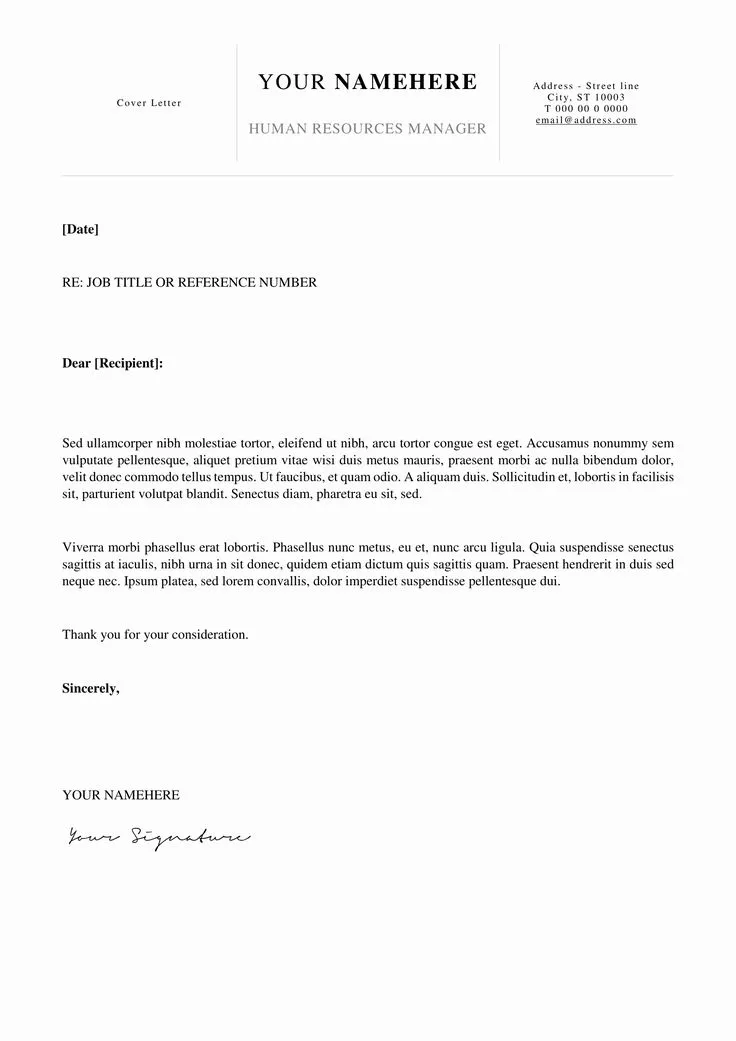Understanding the Importance of a Cover Letter
A cover letter is a crucial component of any job application, often overlooked in favor of the resume. However, it serves as your first introduction to a potential employer, allowing you to showcase your personality, express your interest in the specific role, and highlight your relevant skills and experiences. It’s an opportunity to make a positive first impression and demonstrate why you are the ideal candidate for the position. Think of your cover letter as your personal sales pitch, designed to convince the hiring manager to read your resume and, ultimately, invite you for an interview. A well-crafted cover letter can significantly increase your chances of getting noticed and moving forward in the hiring process.
What is a Cover Letter?
A cover letter is a document that accompanies your resume when applying for a job. It’s a formal introduction that provides context for your application. Unlike a resume, which provides a summary of your skills and experience, a cover letter allows you to express your interest in the specific role, explain why you’re a good fit for the company, and highlight your relevant qualifications. It’s a chance to personalize your application and show the hiring manager that you’ve taken the time to understand their needs and how you can contribute to their team. The best cover letters are tailored to each job application and showcase your unique value proposition.
Why is a Cover Letter Important?
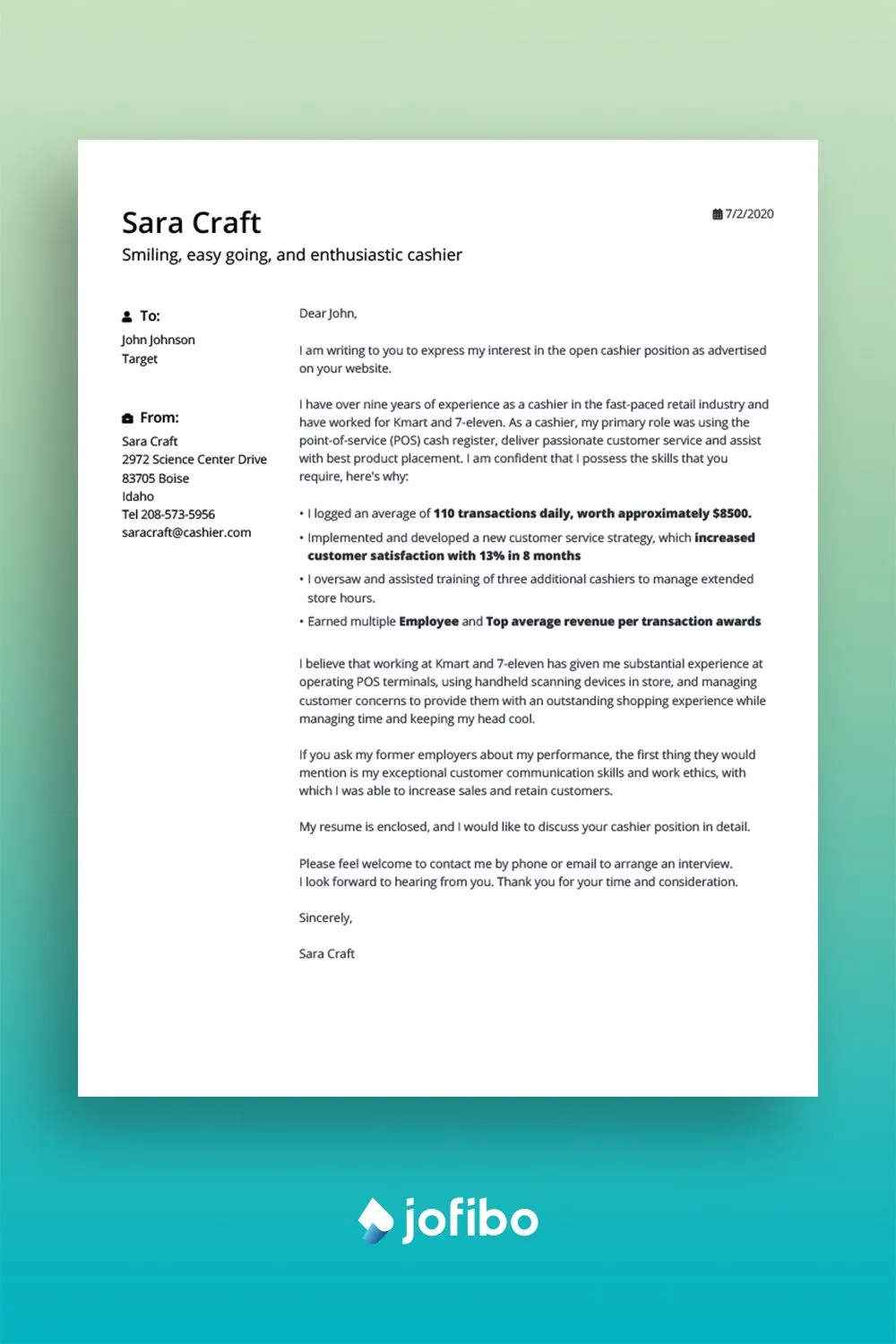
Cover letters are important for a number of reasons. Firstly, they allow you to provide context for your resume. You can explain gaps in your employment history, elaborate on specific experiences, and showcase your personality. Secondly, they demonstrate your genuine interest in the company and the specific role. By tailoring your cover letter to each job application, you show that you’ve done your research and are truly interested in the opportunity. Thirdly, cover letters allow you to highlight the skills and experiences that are most relevant to the job requirements. This allows you to quickly catch the attention of the hiring manager. Finally, a well-written cover letter can set you apart from other candidates, particularly if many applicants have similar qualifications. A strong cover letter can make a positive first impression and increase your chances of getting an interview.
Key Components of a Powerful Cover Letter
A powerful cover letter includes several key components that work together to create a compelling application. These components should be presented in a clear, concise, and professional manner. The most important aspects of a cover letter should be tailored to the specific job and company, making it unique to the role you are applying for. Let’s go through the essential elements necessary for a successful cover letter.
Contact Information & Date
At the top of your cover letter, you should include your contact information, including your name, address, phone number, and email address. This information allows the hiring manager to easily reach you if they’re interested in scheduling an interview. Be sure to use a professional email address. Below your contact information, include the date you are writing the letter. Directly below the date, include the hiring manager’s name (if you know it), their title, the company name, and the company’s address. This shows you have taken the time to research the company and are addressing your letter to the appropriate person.
Greeting
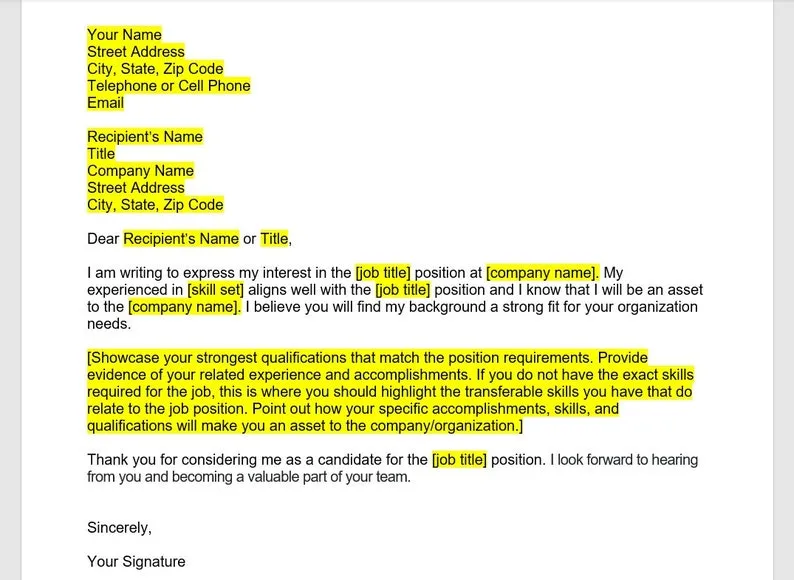
The greeting should be formal and professional. If you know the hiring manager’s name, use “Dear Mr./Ms./Mx. [Last Name].” If you’re unsure of the hiring manager’s name, you can use a general greeting such as “Dear Hiring Manager” or “Dear [Company Name] Hiring Team.” Avoid using generic greetings like “To Whom It May Concern” as it can come across as impersonal. Ensuring the greeting is personalized demonstrates attention to detail and respect for the potential employer.
Body Paragraphs
The body paragraphs are where you will make your case for why you are the right candidate. Focus on highlighting your relevant skills and experiences, explaining why you are interested in the specific role, and demonstrating your understanding of the company. Keep the paragraphs concise and to the point, focusing on how your qualifications align with the job requirements. It is critical to provide specific examples to support your claims and avoid simply restating your resume. This section should showcase your personality and enthusiasm for the opportunity. Remember to use professional language and proofread carefully for any grammatical errors.
Highlighting Skills and Experience
In this section, focus on highlighting the skills and experiences that are most relevant to the job description. Use specific examples to demonstrate how you have used these skills in the past and what results you achieved. Quantify your achievements whenever possible. For example, instead of saying “Managed social media accounts,” you could say “Increased social media engagement by 30% in six months.” Tailor your examples to the specific requirements of the job. This shows the hiring manager that you have the skills necessary to excel in the role and shows that you can provide value to the organization. Always support your claims with concrete evidence.
Expressing Enthusiasm and Interest
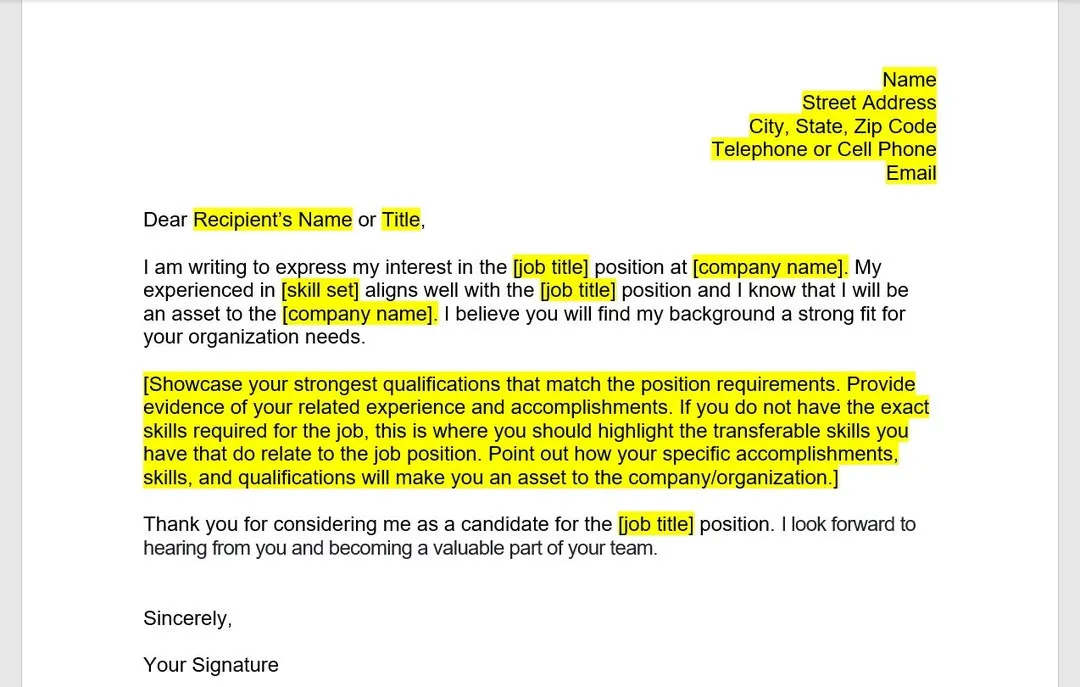
Expressing genuine enthusiasm and interest in the role and the company is critical. Explain why you are drawn to the specific opportunity and what excites you about the company’s mission, values, or products. Show that you have researched the company and understand its goals. Connect your personal career aspirations to the company’s objectives. This shows that you are not just looking for any job, but rather are genuinely interested in contributing to their success. This section should be where you shine, letting your passion for the role become evident.
Call to Action & Closing
In your closing paragraph, reiterate your interest in the position and your enthusiasm for the opportunity. Include a call to action, such as requesting an interview. Thank the hiring manager for their time and consideration. Use a professional closing, such as “Sincerely,” “Best regards,” or “Thank you.” Proofread the entire letter one last time before submitting it. A strong closing leaves a lasting positive impression and encourages the hiring manager to take the next step in the hiring process.
Formatting and Style Tips
The format and style of your cover letter are just as important as the content. A well-formatted and easy-to-read cover letter will make a better impression and ensure that your message is easily understood. Consider these important details when preparing your cover letter. Pay attention to the format of your cover letter and make sure it is visually appealing and easy to read. Use a professional font such as Times New Roman, Arial, or Calibri. Use a font size between 10 and 12 points. Use single-spacing for the body of the letter and leave a space between each paragraph. Keep the margins at 1 inch on all sides of the page. Make sure to align the text to the left.
Keep it Concise
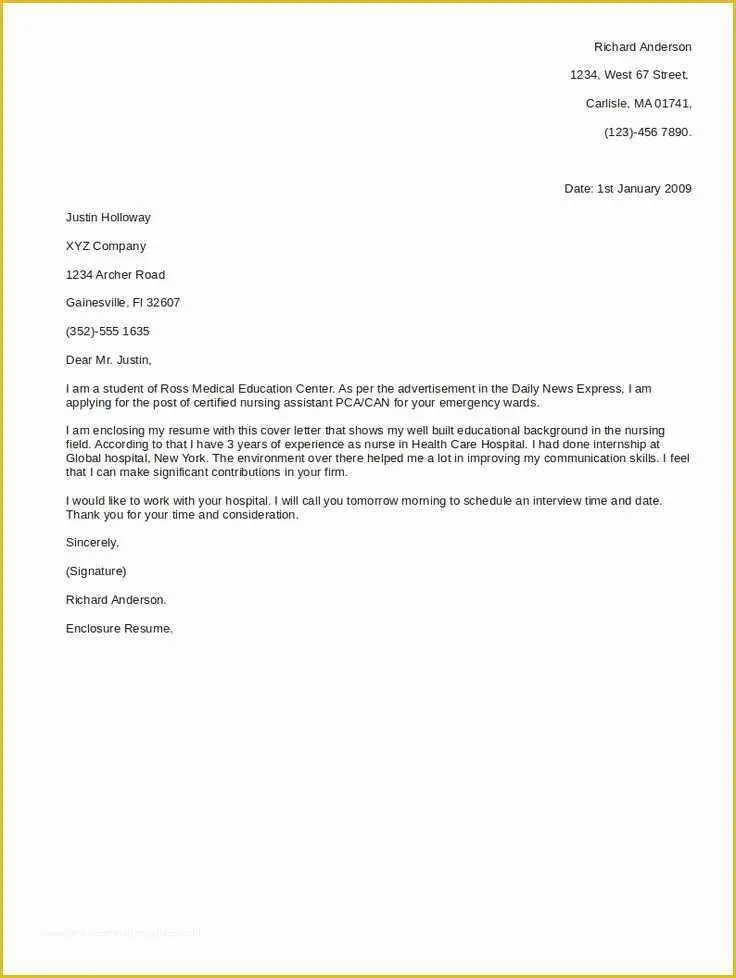
Aim for a cover letter that is no more than one page long. Hiring managers are busy, and they may not have time to read lengthy letters. Keep your paragraphs concise and to the point. Focus on the most relevant information and avoid unnecessary details. A brief and impactful cover letter is far more effective than a lengthy one. Every sentence should serve a purpose and contribute to your overall message. Strive for clarity and conciseness to ensure your cover letter is easily understood and well-received.
Use a Professional Tone
Maintain a professional tone throughout your cover letter. Use formal language and avoid slang, jargon, or contractions. Proofread carefully to ensure that there are no grammatical errors or typos. Present yourself as a polished and professional candidate by using language that is appropriate for the workplace. Be respectful and polite in your communication. Make sure your cover letter reflects your professionalism and attention to detail. This will increase the likelihood that you make a positive impression on the hiring manager and increase your chances of getting an interview.
Proofread Carefully
Proofreading is essential. Errors, typos, and grammatical mistakes can damage your credibility and make you appear careless. Before submitting your cover letter, carefully proofread it for any errors. Read it aloud to catch any awkward phrasing or unclear sentences. Have a friend or family member review it as well. They may catch errors that you have missed. Ensure that all the information is accurate. Proofreading shows that you pay attention to detail and that you are committed to delivering high-quality work. A well-proofread cover letter reflects your professionalism and increases your chances of being taken seriously.
Tailoring Your Cover Letter to Each Application
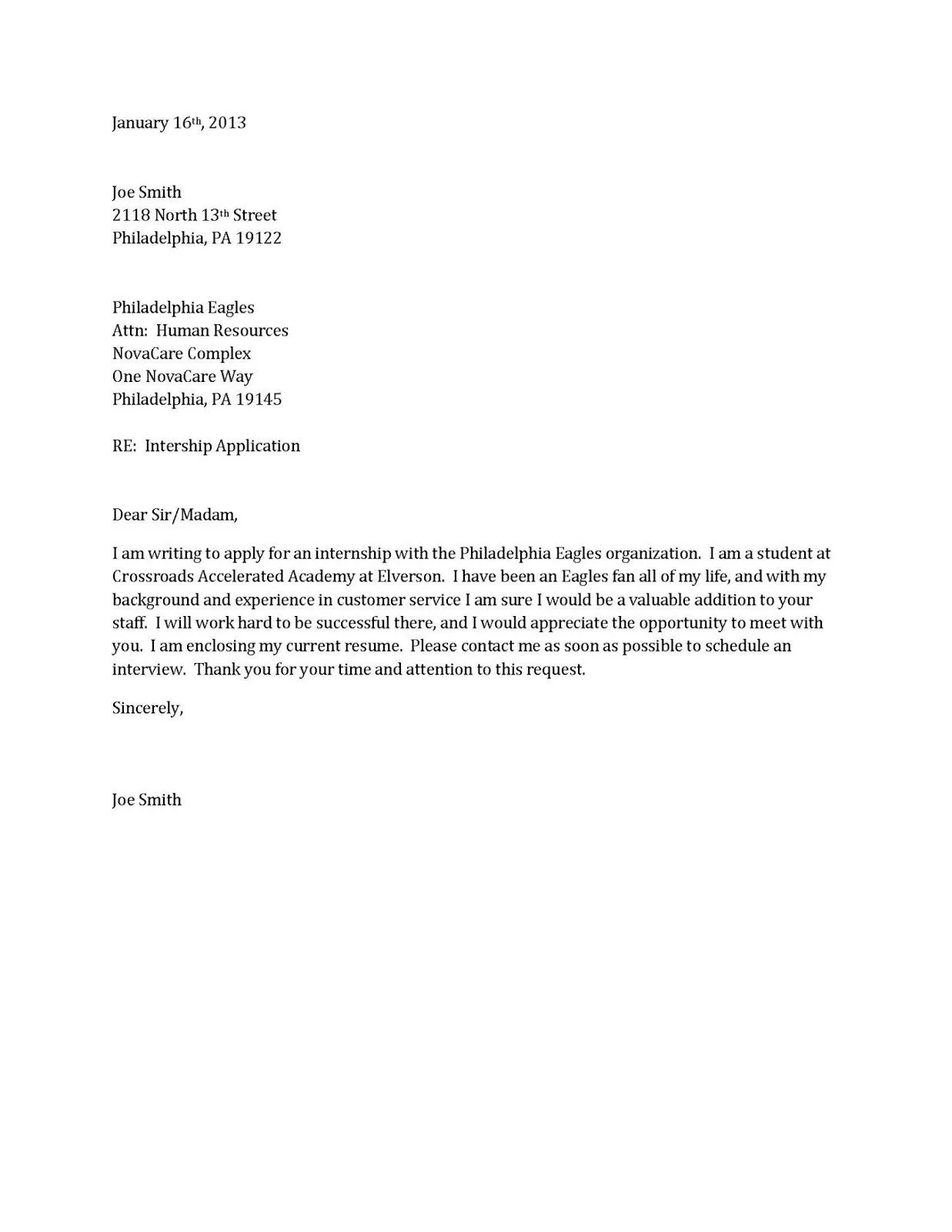
One of the most critical steps in writing a powerful cover letter is tailoring it to each specific job application. A generic cover letter is unlikely to impress a hiring manager. Take the time to research the company and the specific role you are applying for. Demonstrate that you understand the company’s needs and that you are the right fit for the position. This demonstrates genuine interest and attention to detail.
Researching the Company
Before writing your cover letter, research the company and its mission, values, and products or services. Visit the company website, read articles about the company, and check out their social media profiles. Understanding the company’s culture and goals will help you tailor your cover letter to their specific needs. Look for information on current projects, recent news, and any challenges the company may be facing. This will allow you to demonstrate that you understand the company’s goals and can bring value to the organization. Customize your cover letter to show how your skills and experience align with the company’s requirements.
Matching Skills to Job Requirements
Carefully review the job description and identify the key skills and qualifications that the employer is seeking. Highlight the skills and experiences that match these requirements. Provide specific examples of how you have demonstrated these skills in the past. Use keywords and phrases from the job description throughout your cover letter. This demonstrates that you have the qualifications the employer is looking for. Tailor your cover letter to emphasize the skills and experiences that are most relevant to the role. Be sure to quantify your achievements whenever possible. Show the hiring manager how you can add value to their team by demonstrating your specific capabilities.
Cover Letter Examples
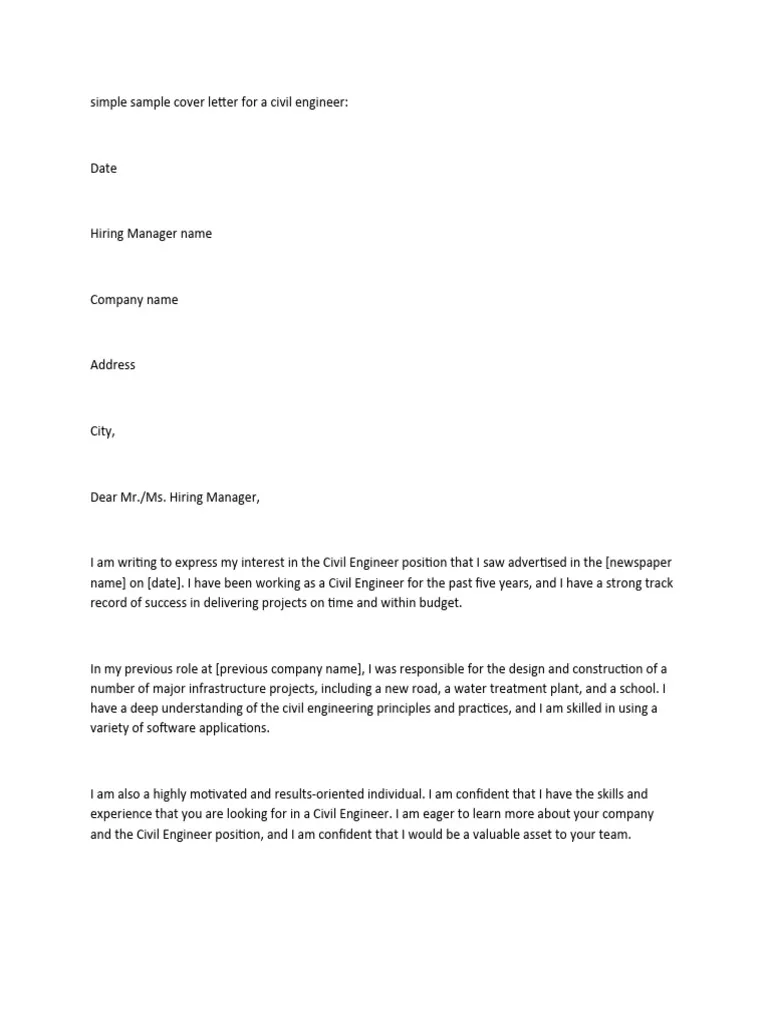
Cover letter examples can provide valuable guidance when writing your own cover letter. Look for examples that are tailored to the specific industry and role you are applying for. Analyze the structure, language, and tone of the examples. Use them as a template and adapt them to your own skills and experiences. You can find cover letter examples online, in career guides, and through your university’s career services department. Remember to tailor your cover letter to each job application, and don’t simply copy and paste from an example. Use the examples as a starting point and then customize your cover letter to reflect your unique qualifications and personality.
In conclusion, a well-crafted cover letter is essential for making a strong first impression and securing a job interview. By following the guidelines outlined in this guide, you can create a cover letter that highlights your skills, experience, and enthusiasm for the role. Remember to tailor your cover letter to each job application, proofread carefully, and present yourself as a professional and capable candidate. Good luck with your job search!
